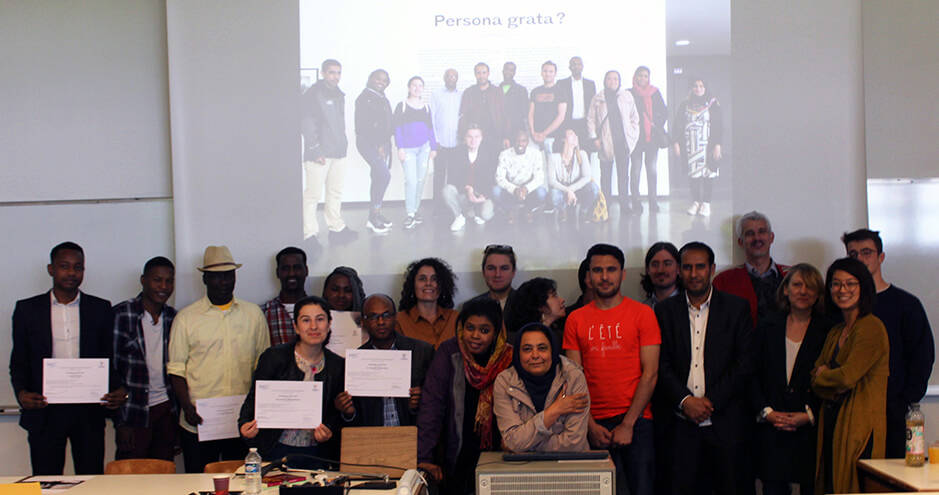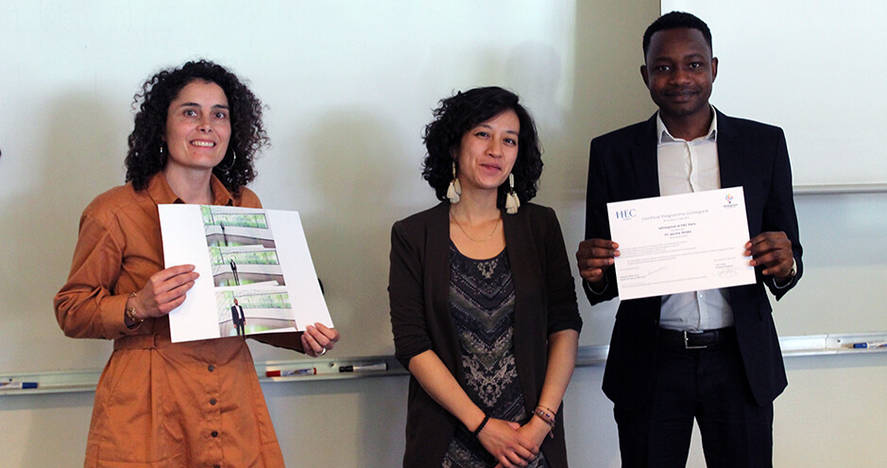Refugees Find New Wings at HEC
A third cohort of refugees graduated from their Wintegreat at HEC program on June 7, receiving their certificates after 12 intensive weeks learning French, English and local culture. This course aims at providing a toolkit for personal and professional integration into the host nation.

“I’m proud to have made the decision to join Wintegreat at HEC. We were and we will remain a single family, I’ll treasure this experience.” “We have come to rebuild our lives in France, and for us to achieve this, the language and culture you have given is vital.” Words uttered by Amer Ibrahim and Hamid Ibrahim (not his real name) respectively, in two of several testimonies shared by the participants of the three-month induction program organized by the Paris NGO Wintegreat. 20 people from all backgrounds were awarded the certificate after an intense program ably marshalled by French teacher Stephanie Som and her colleague Geraldine Chamart.
This education program is one of 10 designed by Wintegreat to help educated but disenfranchised refugees create or revive their professional careers. Hailing from Afghanistan, Pakistan, Libya, Russia, Yemen, Eritrea, Sudan, Kenya, Guinea, Somalia and Georgia, the HEC participants learnt or perfected their French and English and were provided with new cultural references by their tutors. The 20 refugees also exchanged with HEC student and staff volunteers and mentors in a drive to fine-tune their professional projects. “I hope this program expands,” said Ibrahim, a former journalist in his Afghanistan who still fears for his family’s safety in his homeland. “Education is a key for peace, prosperity and integration in these challenging times. Please continue to provide both.”
Photographs, Words and a Film
The second Wintegreat cohort had enjoyed an equally rich experience at HEC a few months previously. This time round, promotion number three expanded on their HEC learning activities with a powerful photographic work inspired by a MAC VAL museum exhibition called “Persona Grata”. This exhibition questions the universal and humanist notion of hospitality. “After visiting the museum in Vitry-sur-Seine, each refugee answered simple questions about what they have found in France, and what they have left behind,” explained Som who provided the photographs. “The answers were both moving and eloquent and we exhibited them at HEC for two months. It was a wonderful way to vehicle the students’ emotions through the new-found French language and to share them with their hosts.”
Jusqu'au 7 juin, vous pouvez découvrir le travail artistique des participants et des #bénévoles du programme @HECParis. Bravo à eux pour leur #talent ! ? pic.twitter.com/vVSDRlVdDU
— Wintegreat (@wintegreat) 4 juin 2019
Exhibited in the business school’s main entrance hall, the photographs and words brought home to the HEC students the frustrations, aspirations and dreams of the 20 refugees. These qualities were also present in a short documentary presented at the closing ceremony by Georgian film-maker Ketevani Barikashvili. Shot in 2012 in Azerbeïdjan, “Là-bas Chez Moi” reflects the sense of irreparable loss and conflict of a refugee torn from his home. Barikashvili hopes to use her Wintegreat at HEC experience to expand on her film work find a new language with which to share it.
Weeks after the graduation ceremony, Wintegreat received a strong boost from La France s’engage in the shape of a €300,000 grant and a three-year personalized coaching program. La France s’engage is an association established by former French president François Hollande in 2016, designed to support a dozen French social enterprises each year. On June 28, it declared Wintegreat one of 12 social entrepreneurs to benefit from its financial and consulting backing to expand its work throughout France. The four-year-old company said it was “proud” to figure on the list, adding that it will help accelerate its training programs aimed at helping refugees find their rightful place in French society.
